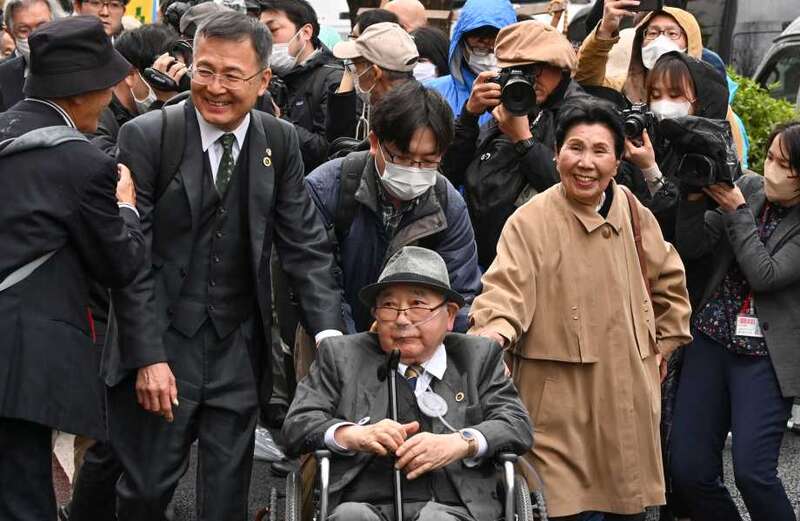THE world's longest-serving death row inmate has been granted a retrial nearly six decades after he was convicted of murder.
Iwao Hakamada, 87, was sentenced to be hanged in Japan in 1968 after confessing to slaying a family of four - but later claimed he only admitted the crimes under duress.



Tokyo's High Court has now ordered a retrial for the former boxer after the emergence of damning DNA evidence cast serious doubts over his guilt.
He has spent the majority of his sentence locked up in solitary confinement with the prospect of his execution looming over him.
His jubilant sister Hideko, who has tirelessly fought for his freedom, said: "I was waiting for this day for 57 years and it has come.
 Two New York cops stabbed during celebrations in Times Square
Two New York cops stabbed during celebrations in Times Square
"Finally a weight has been lifted from my shoulders," the 90-year-old added.
Hakamada's hopeful legal team unfurled banners with the words "retrial" while people chanted "Free Hakamada now" outside the court after a brief hearing.
He has spent 55 years awaiting his capital punishment - seeing him certified as the world's longest-serving death row inmate by Guinness World Records in 2014.
The former pro boxer was set to be hanged after police discovered the charred remains of his boss Fumio Hashiguchi, the man's wife, and their two teenage children.
He had worked at the family's miso factory until a devastating fire ripped through Hashiguchi's home on June 30, 1966.
Hakamada told cops he helped extinguish the blaze only to discover the victims - who had all been stabbed to death.
Around ¥200,000 (£1,225) in cash was also stolen from the scorched home.
Hakamada was arrested two months later and initially vehemently denied the accusations, until he later confessed.
But the ex-factory worker alleged he only admitted guilt after a gruelling 20-day interrogation where he was brutally beaten.
Japan has been heavily criticised by human rights groups for their reliance on confessions, claiming police often obtain them by force.
 At least nine killed after New Year's Day stampede at shopping centre
At least nine killed after New Year's Day stampede at shopping centre
Hakamada's attempts to retract his "forced" confession were rejected by the Supreme Court in 1980.
After years behind bars and an exhausting legal battle, he was released from jail and granted a retrial in 2014 by a district court in the central city of Shizuoka, after they ruled investigators could have planted evidence.
But Tokyo's High Court overturned the lower court ruling four years later, and the case was sent to the Supreme Court on appeal.
The judges ruled in 2020 that the Tokyo High Court must reconsider its decision.
Focus has been heavily directed on one key piece of evidence, a set of blood-stained clothes, that helped secure Hakamada's conviction.
But the evidence only came to light more than a year after the crime.
The clothing reportedly did not even fit him and the bloodstains appeared to be too vivid despite allegedly being over 12 months old.
DNA tests concluded that there was no link between Hakamada, the clothes or the blood - but the High Court rejected the testing methods.
The toll of Hakamada's campaign for justice has seemingly taken its toll on him after almost six decades after his conviction.
His sister told media that she has refrained from discussing the case with her sibling in the hopes of keeping him positive.
Hideko said: "I will only tell him to rest assured, because we got a good result.
"Now, I just need to make sure I can see the retrial begin."
Hakamada told AFP in 2018 he felt he was "fighting a bout every day."
National broadcaster NHK said the court's presiding judge Fumio Daizen raised concerns about the credibility of the clothes as evidence.
He was quoted saying: "There is no evidence other than the clothes that could determine Hakamada was the perpetrator, so it is clear that reasonable doubt arises."
Japan is the only major industrialised democracy other than the US that still uses capital punishment.
The death sentence is usually only imposed for multiple murders, although it has also been implemented in rare cases of single murders.
Death row inmates are not considered prisoners by the justice system, meaning they lack many rights given to other lags.
Those awaiting execution are often held in solitary confinement and are forbidden to communicate with their fellow prisoners.
Hangings can be given the go-ahead with just a few hours' notice, forcing prisoners to endure a torturous daily ordeal as they wait to meet their fate.
Hakamada's supporters have called for a fast-track of the retrial amid fears the process could take years.
Motoji Kobayashi, president of the Japan Federation of Bar Associations, said: "We cannot afford any further delay to remedy Mr Hakamada, who has an advanced age of 87 and suffers mental and physical conditions after 47 years of physical restraint."
The pensioner has been serving his sentence at home since his 2014 release as his frail health and age make him low risk for escape.
Amnesty International welcomed the ruling as a "long-overdue chance to deliver some justice."
The human rights group's Japan director Hideaki Nakagawa said: "Hakamada's conviction was based on a forced 'confession' and there are serious doubts about the other evidence used against him.
"Prosecutors 'must not appeal against today's ruling and prolong the limbo Hakamada has been in since his 'temporary release' nine years ago.
"They must allow this retrial to take place while Hakamada is still able to participate in the proceedings."

































